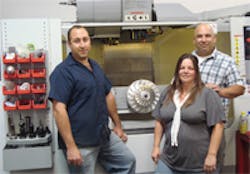Signs of 14-hour days, no weekends, are strewn everywhere. Shelves are lined with blade parts of every kind for fans and compressors, for impellers of dozens of sizes and shapes.
But, stuffed in a nook between two shelves lie indications suggesting otherwise. Two racing dirt bikes, still caked with dried mud, have yet to be cleaned from rides the previous evening.
These days, free time for even their most passionate pursuits isn’t easy for Ray Kinner and Max Luna. The brothers’ two-year-old shop, Kinner Manufacturing, requires more hours than there are in a day and more days than are available in a week.
“It makes for some ridiculous hours,” said Ray Kinner. “But, you do it because you love your shop and you love what you’re doing.”
| • Kinner Manufacturing, Olivehurst, Calif. www.kinnermanufacturing.com • Number of employees — 5 • 2009 sales — $300,000 2008 sales — $300,000 • Markets served: Power generation, rail, natural gas, water, agriculture |
In the short time of its existence, Kinner Manufacturing has established a presence in what the brothers sensed to be a highly undervalued market: manufacturing bladed products for fans, compressors, pumps and turbines. The shop addresses industries across a wide spectrum, from power generation to agriculture to cryogenics, producing blades, vanes, BLISKs, IBRs, radial and axial impellers, diffusers, rotor shafts and hubs.
It has required the ability to mobilize operations quickly, adjust on the fly, and respond to any number of events that couldn’t have been predicted. Barely a year after launching the company and signing the papers on new capital equipment, Kinner Manufacturing confronted an epic economic recession, while still facing years of payments for initial startup costs.
With a limited budget, Ray and Max have been able to maximize their resources and establish an impressive operation. One of the critical stages in manufacturing impellers is heating the metal in an industrial oven. But, unable to afford the $10,000 price point, Max turned to Craigslist. There, he found a used pizza oven the seller was offering for $500; he paid less than half that.
For carbide boring bars, Ray found a steal on EBay. Max snared two air conditioning units from a paint contractor he met one weekend in San Francisco. They even bartered for the installation.
“If you have the energy and the desire and you have the tools and expertise, you can find solutions to a lot of problems,” said Max.
Kinner Manufacturing’s operations are fairly modest, consisting of two five-axis mills, and a balancer. The most aggressive initial investment, said Max, was to purchase a Concepts NREC suite. The software, he explained, allows them to produce complex blade geometry that otherwise wouldn’t be possible on their machines.
“For us, the software is the trick because it allows us to manipulate it and come up with amazing cutting strategies,” said Max. “But in the end, it’s still a matter of telling the software what to do. You still have to have high-quality tools and be able to know what you’re doing. That’s the only way you can compete with China.”
There have been some helpful breaks along the way. Kinner Manufacturing was ready to sign a deal for a new piece of equipment last winter that at the last minute fell through. Had the purchase been completed, the company’s finances might have hit the breaking point over the last year.
Such a small operation, in such a specialized field, puts a great deal of emphasis on the skills and talents of its owners. Ray, who began working in his father’s machine shop at the age of 11, continually tries to refine the processes on his impellers. In a recent case, a 16–in. diameter impeller took 12 hours to machine. The challenge, he said, was cutting the 3.5-in. impellers, which are long and thin.
Using a combination of high-speed tools, tool holders, switching carbides, and taking various approaches with the geometries, Ray was able to reach a higher rate of material removal, with better chip control. Within two months, the process was down to two hours.
Unlike a more established shop, Kinner Manufacturing is still in the process of developing its customer base. It began offering to produce finished castings, along with prototype work, and reverse engineered parts.
There are no plans for upgrades in new capital machinery for Kinner Manufacturing. Instead, Max said he would like to address the most glaring source of geographical inefficiency in blade manufacturing: spin pit testing.
A spin pit is a lead-enclosed facility in which an impeller is run at 115% of its maximum operating speed in order to test its integrity. Only one such facility resides on the West Coast. Most of Kinner Manufacturing’s products are shipped cross-country to spin pits in either Massachusetts or Pennsylvania, at a premium cost, and delivery delay of at least three weeks.
“We see a need to establish a spin pit facility on the west coast,” said Max. “There aren’t many of them. I would guess there are less than a 1,000 in the world. The thing is they’re very expensive. And, the insurance is very high to have one. There’s a huge need and we think we can address it.”
